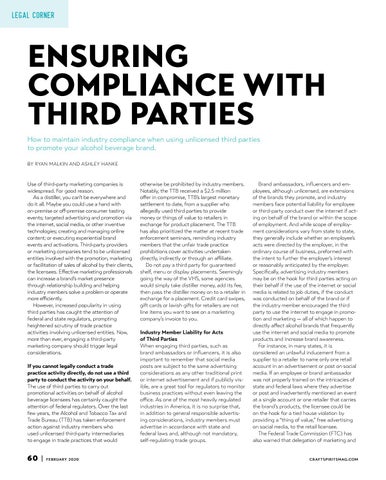legal corner
ENSURING COMPLIANCE WITH THIRD PARTIES How to maintain industry compliance when using unlicensed third parties to promote your alcohol beverage brand. BY RYAN MALKIN AND ASHLEY HANKE
Use of third-party marketing companies is widespread. For good reason. As a distiller, you can’t be everywhere and do it all. Maybe you could use a hand with on-premise or off-premise consumer tasting events; targeted advertising and promotion via the internet, social media, or other inventive technologies; creating and managing online content; or executing experiential brand events and activations. Third-party providers or marketing companies tend to be unlicensed entities involved with the promotion, marketing or facilitation of sales of alcohol by their clients, the licensees. Effective marketing professionals can increase a brand’s market presence through relationship building and helping industry members solve a problem or operate more efficiently. However, increased popularity in using third parties has caught the attention of federal and state regulators, prompting heightened scrutiny of trade practice activities involving unlicensed entities. Now, more than ever, engaging a third-party marketing company should trigger legal considerations. If you cannot legally conduct a trade practice activity directly, do not use a third party to conduct the activity on your behalf. The use of third parties to carry out promotional activities on behalf of alcohol beverage licensees has certainly caught the attention of federal regulators. Over the last few years, the Alcohol and Tobacco Tax and Trade Bureau (TTB) has taken enforcement action against industry members who used unlicensed third-party intermediaries to engage in trade practices that would
60 |
F EBRUARY 2020
otherwise be prohibited by industry members. Notably, the TTB received a $2.5 million offer in compromise, TTB’s largest monetary settlement to date, from a supplier who allegedly used third parties to provide money or things of value to retailers in exchange for product placement. The TTB has also prioritized the matter at recent trade enforcement seminars, reminding industry members that the unfair trade practice prohibitions cover activities undertaken directly, indirectly or through an affiliate. Do not pay a third party for guaranteed shelf, menu or display placements. Seemingly going the way of the VHS, some agencies would simply take distiller money, add its fee, then pass the distiller money on to a retailer in exchange for a placement. Credit card swipes, gift cards or lavish gifts for retailers are not line items you want to see on a marketing company’s invoice to you. Industry Member Liability for Acts of Third Parties When engaging third parties, such as brand ambassadors or influencers, it is also important to remember that social media posts are subject to the same advertising considerations as any other traditional print or internet advertisement and if publicly visible, are a great tool for regulators to monitor business practices without even leaving the office. As one of the most heavily regulated industries in America, it is no surprise that, in addition to general responsible advertising considerations, industry members must advertise in accordance with state and federal laws and, although not mandatory, self-regulating trade groups.
Brand ambassadors, influencers and employees, although unlicensed, are extensions of the brands they promote, and industry members face potential liability for employee or third-party conduct over the internet if acting on behalf of the brand or within the scope of employment. And while scope of employment considerations vary from state to state, they generally include whether an employee’s acts were directed by the employer, in the ordinary course of business, preformed with the intent to further the employer’s interest or reasonably anticipated by the employer. Specifically, advertising industry members may be on the hook for third parties acting on their behalf if the use of the internet or social media is related to job duties, if the conduct was conducted on behalf of the brand or if the industry member encouraged the third party to use the internet to engage in promotion and marketing — all of which happen to directly affect alcohol brands that frequently use the internet and social media to promote products and increase brand awareness. For instance, in many states, it is considered an unlawful inducement from a supplier to a retailer to name only one retail account in an advertisement or post on social media. If an employee or brand ambassador was not properly trained on the intricacies of state and federal laws where they advertise or post and inadvertently mentioned an event at a single account or one retailer that carries the brand’s products, the licensee could be on the hook for a tied house violation by providing a “thing of value,” free advertising on social media, to the retail licensee. The Federal Trade Commission (FTC) has also warned that delegation of marketing and
C R AF T S PI R I T S MAG .CO M
